 |
 |
 |
There are almost as many myths and misconceptions about sharks as there are species. NOVA asked Dr. Samuel "Sonny" Gruber, arguably the world's leading shark researcher, to unmuddy the waters about this most maligned of fish. A professor of marine biology at the University of Miami's Rosenstiel School of Marine and Atmospheric Science, Gruber has been called the "guru of sharks." He has more than 100 published scientific papers to his credit, and his work on the behavior and physiology of lemon sharks in Bimini constitutes the most extensive studies on any shark species.
Gruber: Most sharks are far too small to be vicious killers of men and women, and many sharks live in the deep sea where no humans swim. The fact remains that around 100 shark attacks do occur each year, but elephants are bigger killers; they do in 200-plus mahoots and trainers each year. Talk about vicious—dogs kill thousands. And get this: Soda machines killed more people last year than sharks did. People get angry at the machines when they steal the $0.75 the person honestly inserts for a cool, refreshing soda. But if no soda comes out, people often viciously attack the machine, trying to make it cough up the soda or the cash. The machines viciously retaliate by falling on and crushing their tormentors.
Gruber: The greatest enemy of sharks is man. He kills and hacks off the fins of 30 to 100 million sharks each year. That is, in three to five years fishers kill the equivalent of the entire population of the U.S. Humans are not natural predators of sharks, as we are terrestrial hunters and didn't really fish for sharks until we became civilized. Now we cut off fins and throw the living creature back to die on the bottom of the sea. Is that civilized? It's true, some shark species are adapted to feed on other sharks; a prime example is the bull shark. In theory, any large shark could consume a smaller one, though this is not usually the case. The most numerous natural enemies of sharks are the various parasites that can kill a shark if they get out of hand.
Gruber: I wrote a paper with Neil Schneiderman in 1975 demonstrating that lemon sharks learn faster and retain a conditioned response longer than a cat or rabbit. Sharks and their large-brained allies the rays have brain/body weight ratios in the range of birds and mammals. Personally, I don't think they're as intelligent as birds or mammals—whatever intelligence is. Still, if you've ever dealt with a chicken you'd think sharks were genius-level creatures.
Gruber: Absolutely. A shark is like the Starship Enterprise, bristling with sensors. The most amazing is its electrical sense. Measurements demonstrate that a shark can detect electric fields of a magnitude similar to a 12-volt car battery placed in the middle of the Atlantic Ocean, with the positive pole connected to Boston Harbor and the negative pole placed in the harbor at Plymouth, England. The miniscule current flowing across the ocean—1/1,000,000,000 volt per square centimeter—would be at a level detectable by sharks. Translated to hunting, a shark can sense a prey in turbid water or buried beneath the seafloor by electrical sense alone. Hearing provides another cue. Sounds of struggling fish attract sharks. Their senses are truly a marvel to behold.
Gruber: I've seen lemon sharks go wild over a single drop of blood in a 2,000-gallon tank. In the underwater world of noses, catfish and eels may take the cake, and salmon, of course, find their home stream after a year or more at sea strictly by smell. Wondrous! But sharks are keen predators and, because they are always searching for food, show up first if there is fish scent in the water. That's why chumming is so effective for sharks. It comes down to the concentration of the stimulating chemical at the nose's receptor cell that determines if an animal will detect a smell. That level is parts per million in sharks and parts per billion in catfish.
Gruber: Yes, and so can we and cats, too. But sharks are especially good at it. In tests I did for my doctorate, I trained sharks to respond to minimum light levels and compared these to human subjects. Sharks were about ten times more sensitive than a human tested in the exact same apparatus. I think sharks can see by starlight on a clear, moonless night. Continue: Do sharks make sounds? Cocos Island | Sharkmasters | World of Sharks | Dispatches E-mail | Resources | Site Map | Sharks Home Editor's Picks | Previous Sites | Join Us/E-mail | TV/Web Schedule | About NOVA Watch NOVAs online | Teachers | Site Map | Shop | Search | To Print PBS Online | NOVA Online | WGBH © | Updated June 2002 |
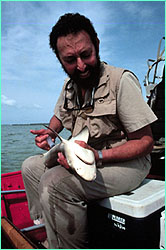 Dr. Samuel "Sonny" Gruber.
Dr. Samuel "Sonny" Gruber.
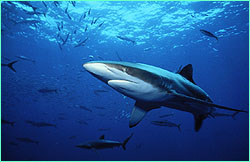 Silky shark
Silky shark
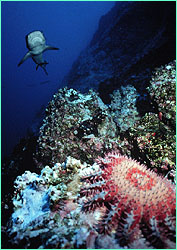 Whitetip reef shark cruises past crown-of-thorns starfish.
Whitetip reef shark cruises past crown-of-thorns starfish.
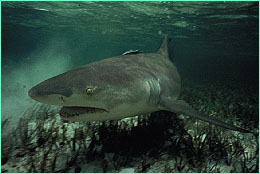 Lemon shark
Lemon shark
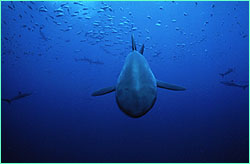 Silky sharking comin' at ye.
Silky sharking comin' at ye.
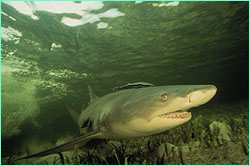 A Lemon shark patrols the shallows.
A Lemon shark patrols the shallows.
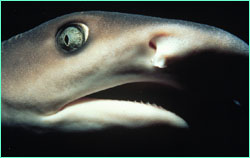 Whitetip reef shark at
Cocos.
Whitetip reef shark at
Cocos.